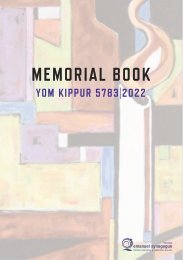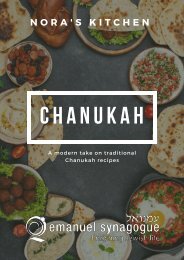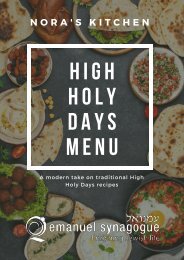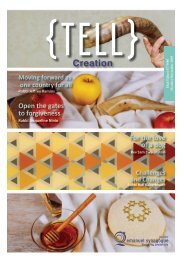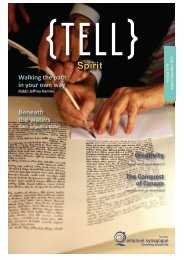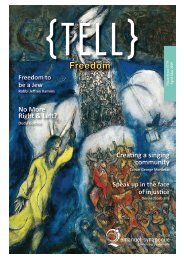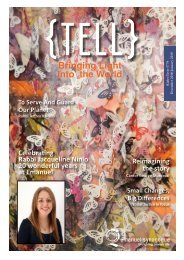TELL Magazine: October - November 2019
The magazine of Emanuel Synagogue, Sydney Australia
The magazine of Emanuel Synagogue, Sydney Australia
You also want an ePaper? Increase the reach of your titles
YUMPU automatically turns print PDFs into web optimized ePapers that Google loves.
about Aboriginal history and culture,<br />
we also learn so much about our<br />
journey as Homo sapiens; about a<br />
highly developed, self-sustaining,<br />
spiritual and unique, semi-nomadic<br />
and agrarian culture. My reading has<br />
also opened my eyes to an inevitable<br />
culture clash between English settlers<br />
and First Nations; the former’s<br />
material power, combined with a<br />
sense of cultural superiority ranging<br />
from paternalism to racism, that led<br />
to the devastation of the latter.<br />
There are so many places where each of<br />
us can begin to learn and understand<br />
the past of this land we share. Billy<br />
Griffiths’ Deep Time Dreaming 1 takes<br />
one on an archaeological tour of<br />
ancient Australia, opening our eyes<br />
to the fact that the knowledge of<br />
Homo sapiens’ arrival in Australia<br />
has shifted our entire understanding<br />
as an evolving species. Bruce<br />
Pascoe’s Dark Emu 2 demonstrates the<br />
previously unacknowledged agrarian<br />
practices of Aboriginal peoples, and<br />
how they developed technology to<br />
work sustainably within a harsh<br />
environment. In Treading Lightly 3 ,<br />
Karl-Erik Sveiby and Tex Skuthorpe<br />
reveal the wisdom behind Aboriginal<br />
practices, offering suggestions about<br />
what we can still learn from the first<br />
inhabitants of this land, in the harsh<br />
environment in which we all live.<br />
Together, these books undermine<br />
the notion that the First Nations of<br />
this land were in any way culturally<br />
or spiritually backward. However,<br />
they were comparatively materially<br />
underdeveloped, and thus subject to<br />
European “might makes right”. There<br />
are several histories, such as Richard<br />
Broome’s Aboriginal Australians 4 and<br />
C.D. Rowley’s The Destruction of<br />
Aboriginal Society 5 , which reveal the<br />
broad history of conflict and endemic<br />
racism of Europeans toward Natives<br />
that has resulted in a decimated<br />
society. The hard hitting The Colonial<br />
Fantasy 6 , by Sarah Maddison,<br />
underscores the fact that Aboriginal<br />
Australians have never given up their<br />
identity and their claims to this land<br />
that they have inhabited for at least<br />
60,000 years; claims that need to be<br />
addressed in contemporary Australia<br />
by all of us.<br />
Hopefully, as we read and learn<br />
in different formats, we will not<br />
only recognise the historic injustice<br />
suffered by the First Nations of this<br />
land, and their descendants, but<br />
we will also feel remorse for not<br />
having done enough to date to make<br />
restitution. I strongly believe that in<br />
the same way that two decades ago<br />
Emanuel Synagogue took a leading<br />
role in the move toward marriage<br />
equality, so too should we take the<br />
lead on this issue at this time. We<br />
have the opportunity now, when<br />
both government and opposition<br />
have in some fashion supported a<br />
referendum to address the inequity<br />
that still plagues society, to help<br />
move justice forward. The 1967<br />
constitutional referendum, the Mabo<br />
case and the Federal apology by<br />
Prime Minister Kevin Rudd in 2007<br />
have been necessary precursors, but<br />
not sufficient responses to actualise<br />
true teshuvah, repentance<br />
and reconciliation. A<br />
beautiful book that can<br />
help open our hearts<br />
and minds to Aboriginal<br />
Australia is called<br />
Growing Up Aboriginal<br />
in Australia 7 , edited by<br />
Anita Heiss. Stan Grant's<br />
Talking to My Country<br />
powerfully presents the<br />
issues of racism and<br />
displacement endemic to<br />
our country. Ever since<br />
Thomas Mayor came to<br />
HEALING THE WORLD<br />
us ‘In Conversation’ in March of<br />
this year, we have been promoting<br />
learning about Indigenous Affairs<br />
under the Social Justice link on our<br />
website. Details of many of the<br />
books mentioned above, plus links to<br />
films and speeches can be found there<br />
as well.<br />
Emanuel Synagogue will continue<br />
to take the lead on this issue over<br />
the year ahead, hoping soon to<br />
have Thomas Mayor’s book launch,<br />
a special screenings of The Final<br />
Quarter, The Australian Dream and<br />
other films and presentations by<br />
leaders of the Aboriginal community.<br />
Only when we recognise the truth of<br />
the past can we truly walk toward the<br />
future together. As it says in Pirkei<br />
Avot 1:18, The Wisdom of our Sages,<br />
“The world stands on three things: on<br />
justice and on truth and on peace.”<br />
We Jews who have been displaced<br />
from our land, suffered as a minority,<br />
and struggled to have our truth heard<br />
and understood by others, should<br />
have great sensitivity and empathy<br />
for the First Nations of this land.<br />
Repentance begins at home, and in<br />
continued over...<br />
7



